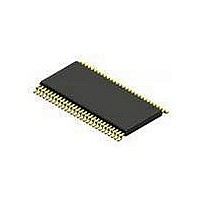PCF85176T/1,118 NXP Semiconductors, PCF85176T/1,118 Datasheet - Page 20

PCF85176T/1,118
Manufacturer Part Number
PCF85176T/1,118
Description
IC LCD DISPLAY DVR 40SEG 56TSSOP
Manufacturer
NXP Semiconductors
Datasheet
1.PCF85176T1118.pdf
(43 pages)
Specifications of PCF85176T/1,118
Package / Case
56-TFSOP (0.240", 6.10mm Width)
Display Type
LCD
Configuration
40 Segment
Interface
I²C
Current - Supply
20µA
Voltage - Supply
1.8 V ~ 5.5 V
Operating Temperature
-40°C ~ 85°C
Mounting Type
Surface Mount
Number Of Digits
20
Number Of Segments
40
Maximum Clock Frequency
2640 Hz
Operating Supply Voltage
1.8 V to 5.5 V
Maximum Power Dissipation
400 mW
Maximum Operating Temperature
+ 95 C
Attached Touch Screen
No
Maximum Supply Current
20 uA
Minimum Operating Temperature
- 40 C
Lead Free Status / RoHS Status
Lead free / RoHS Compliant
Digits Or Characters
-
Lead Free Status / Rohs Status
Details
Other names
568-5933-2
PCF85176T/1,118
PCF85176T/1,118
Available stocks
Company
Part Number
Manufacturer
Quantity
Price
Part Number:
PCF85176T/1,118
Manufacturer:
NXP/恩智浦
Quantity:
20 000
NXP Semiconductors
PCF85176_1
Product data sheet
7.16.3 System configuration
7.16.4 Acknowledge
A device generating a message is a transmitter, a device receiving a message is the
receiver. The device that controls the message is the master and the devices which are
controlled by the master are the slaves (see
The number of data bytes transferred between the START and STOP conditions from
transmitter to receiver is unlimited. Each byte of eight bits is followed by an acknowledge
cycle.
Acknowledgement on the I
Fig 13. Definition of START and STOP conditions
Fig 14. System configuration
•
•
•
•
A slave receiver, which is addressed, must generate an acknowledge after the
reception of each byte.
A master receiver must generate an acknowledge after the reception of each byte that
has been clocked out of the slave transmitter.
The device that acknowledges must pull-down the SDA line during the acknowledge
clock pulse, so that the SDA line is stable LOW during the HIGH period of the
acknowledge related clock pulse (set-up and hold times must be taken into
consideration).
A master receiver must signal an end of data to the transmitter by not generating an
acknowledge on the last byte that has been clocked out of the slave. In this event, the
transmitter must leave the data line HIGH to enable the master to generate a STOP
condition.
SCL
SDA
SDA
SCL
TRANSMITTER/
RECEIVER
MASTER
START condition
All information provided in this document is subject to legal disclaimers.
S
Rev. 01 — 14 April 2010
RECEIVER
2
C-bus is illustrated in
SLAVE
TRANSMITTER/
RECEIVER
Universal LCD driver for low multiplex rates
SLAVE
Figure
Figure
14).
TRANSMITTER
15.
MASTER
STOP condition
P
PCF85176
TRANSMITTER/
© NXP B.V. 2010. All rights reserved.
RECEIVER
MASTER
mbc622
mga807
SDA
SCL
20 of 43















